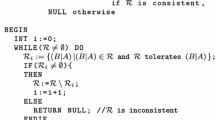Abstract
Inferring prior unknown knowledge from the information given is a core task of the discipline knowledge representation and reasoning in (symbolic) artificial intelligence. With conditionals as building blocks of knowledge bases, inductive methods generate epistemic states on which inference relations are defined. This thesis recalls established approaches to these tasks, and both researches them and compares them based on formal properties. It uses network approaches to make the tasks of generating and storing the results easier, and researches the applicability of formal methods to the results of psychological studies to model human reasoning. In recalling techniques like the so called OCF-networks and Inference Patterns, this dissertation abstract provides a brief view into these topics.

Similar content being viewed by others
Explore related subjects
Discover the latest articles and news from researchers in related subjects, suggested using machine learning.References
Adams EW (1975) The Logic of conditionals: an application of probability to deductive logic. Synthese library. Springer, Dordrecht
Beierle C, Eichhorn C, Kern-Isberner G, Kutsch S (2018) Properties of skeptical c-inference for conditional knowledge bases and its realization as a constraint satisfaction problem. Ann Math Artifi Intell (Online first)
Beierle C, Eichhorn C, Kutsch S (2016) A practical comparison of qualitative inferences with preferred ranking models. KI - Künstliche Intelligenz 31(1):41–52
Byrne RM (1989) Suppressing valid inferences with conditionals. Cognition 31:61–83
Eichhorn C (2018) Qualitative rational reasoning with finite conditional knowledge bases. Ph.D. thesis, Technische Universität Dortmund, Dortmund, Germany (to be published)
Eichhorn C, Kern-Isberner G (2014) LEG networks for ranking functions. In: Fermé E, Leite J (eds) Logics in artificial intelligence (proceedings of the 14th European conference on logics in artificial intelligence (JELIA’14)), Lecture Notes in Computer Science, vol 8761. Springer, Cham, pp 210–223
Eichhorn C, Ragni M, Kern-Isberner G (2018) Rational inference patterns based on conditional logic. In: Proceedings of the thirty-second AAAI conference on artificial intelligence (AAAI-18). AAAI Press, Palo Alto
Finetti B (1974) Theory of probability, vol 1. Wiley, New York
Goldszmidt M, Pearl J (1996) Qualitative probabilities for default reasoning, belief revision, and causal modeling. Artif Intell 84(1–2):57–112
Kern-Isberner G (2001) Conditionals in nonmonotonic reasoning and belief revision–considering conditionals as agents no. 2087 in Lecture Notes in Computer Science. Springer, Berlin
Kern-Isberner G, Eichhorn C (2013) Intensional combination of rankings for OCF-networks. In: Boonthum-Denecke C, Youngblood MG (eds) Proceedings of the twenty-sixth international florida artificial intelligence research society conference (FLAIRS 2013), pp 615–620
Kraus S, Lehmann DJ, Magidor M (1990) Nonmonotonic reasoning, preferential models and cumulative logics. Artif Intell 44(1–2):167–207
Lemmer JF, Barth SW (1982) Efficient minimum information updating for Bayesian inferencing in expert systems. In: Tenenbaum JM (eds) Proceedings of the second national conference on artificial intelligence, AAAI-82. AAAI Press, Palo Alto
Makinson D (1994) General patterns in nonmonotonic reasoning. In: Gabbay DM, Hogger CJ, Robinson JA (eds) Handbook of logic in artificial intelligence and logic programming, vol 3. Oxford University Press, New York, pp 35–110
Paris JB (1994) The uncertain reasoner’s companion: a mathematical perspective. Cambridge tracts in theoretical computer science. Cambridge University Press, Cambridge, UK
Pearl J (1988) Probabilistic reasoning in intelligent systems. Morgan Kaufmann Publishers Inc., San Francisco
Spohn W (2012) The laws of belief: ranking theory and its philosophical applications. Oxford University Press, Oxford
Author information
Authors and Affiliations
Corresponding author
Additional information
The thesis was supported by Grant KI1413/5-1 of Deutsche Forschungsgemeinschaft (DFG) to Gabriele Kern-Isberner as part of the priority program “New Frameworks of Rationality” (SPP 1516).
Rights and permissions
About this article
Cite this article
Eichhorn, C. Dissertation Abstract: Qualitative Rational Reasoning with Finite Conditional Knowledge Bases. Künstl Intell 33, 93–96 (2019). https://doi.org/10.1007/s13218-018-00569-8
Published:
Issue Date:
DOI: https://doi.org/10.1007/s13218-018-00569-8




